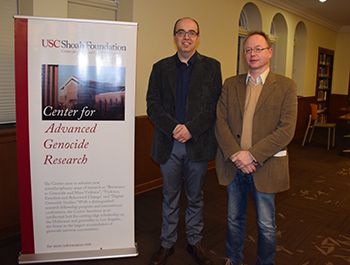Center Fellow Discusses Religion and Survival in Occupied Soviet Territories
Kiril Feferman, 2015-16 Fellow at USC Shoah Foundation Center for Advanced Genocide Research, concluded his four-month fellowship with a lecture Feb. 2 at USC about stories of religiously motivated survival and rescue in the occupied Soviet territories during World War II.
Feferman began his talk by noting that his time at USC Shoah Foundation has been one of the most interesting fellowships he’s ever had, and the Visual History Archive is truly a “treasure.”
He began his fellowship wanting to research how religion played a role in Jewish survival in Soviet territories that came under Nazi occupation during World War II, but soon discovered that the topic would be more difficult than he thought. Survival of Jews in these areas was extremely low, only about 0.2 percent, and those that did survive had few opportunities to tell their stories. USC Shoah Foundation, Feferman said, recorded survivor testimonies at the last moment; now, almost no survivors remain.
“The role of USC Shoah Foundation was very essential in preserving the memory of what happened there,” Feferman said.
Feferman said the testimonies that are preserved in the Visual History Archive tend to be more positive, telling mostly good stories about survival and receiving help. But it’s important to remember that these testimonies represent only a small fraction of what happened in this region; again very, very few survived.

Jews were often conflicted about whether they should use Christianity to help them survive. In one testimony, a survivor describes being at a mass baptism of Jews and asking a rabbi why he was there. The rabbi said he would remain faithful in his heart. The survivor ultimately decided not to go through with the baptism and was saved when everyone who had been baptized was killed. Another survivor said a strange, strong wind prevented him from entering a church for safety. He took it as a sign and followed the wind to the home of a Jewish dentist who helped him hide, thereby saving his life.
The local Christian population sometimes tried to help Jews out of respect for their strong religious faith, especially Baptists. Feferman described a few instances of “interfaith dialogue” that he found in the Visual History Archive, including Christians giving bread to Jews before Yom Kippur and one woman even giving a Jew a prayer book so he could continue practicing his faith.
Survivors who talk about praying in their testimonies say they prayed for salvation, to save their friends and families, and to try to understand the incomprehensible, Feferman reported. Some felt that their prayers were heard while others felt they were left with more questions after speaking to God. One survivor was so strong of faith that he fasted for Yom Kippur while hiding in the forest, already starving with no shelter or warmth, even after finding potatoes which were the most sought-after food.
Feferman concluded that while most devout people became less observant as the war went on, a small minority of Christians were motivated by religion and went out of their way to help Jews. He estimates that about 10 percent of rescuers in the occupied Soviet territories were motivated by religion, which is huge for a region that was supposed to be Marxist and therefore atheist.
He also said that religion helped people survive when they had a large supportive community around them, but once most of their community had been killed, their religion became a liability. It was too difficult to survive while maintaining dietary restrictions and staying isolated from the local population.